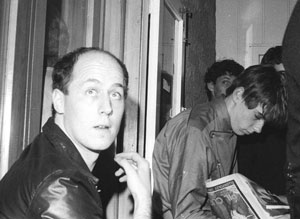The Hills Are Alive
To quote Julie Andrews (and why not, when I was growing up, she was seen by the world at large as the epitome of all things good and decent, that is, until she took her top off in some piece of fluff some years later and willingly destroyed that pre-conception...but then again, those of us who knew where the dirty words were in “TSOM” were never fooled anyway)..lets start at the very beginning…
A few weeks back I opened the post to a promo copy of the new Kraftwerk live album “Minimum-Maximum”. These things sometimes turn up in the mail sometimes, courtesy of a promo person somewhere and obviously I’m not one to look a gift horse in the….I’m pretty grateful. Especially since its Kraftwerk and I’m a fan and a bit of completist. But, that aside, I love and need new music and it helps to satiate a craving. The album had a tracklisting and not much more on the sleeve, but it did the trick. You would imagine that the King Klang crew would sound petty much the same live or studio. But the live versions added a completely new raw spirit to the, perhaps, overly familiar soundscapes that are “Trans Europe Express”, “Autobahn” and the rest and, with a ton of paperwork to do in May, it became the late night, rather loud, soundtrack to several GST returns and a lot of writing before I left the country.
As the album was due for release early June, I passed on the promo copy to a mate before I left NZ and, like a dutiful consumer, picked up a “proper” EMI release from the HMV in
But can I get the thing to play on the laptop (which is a primary audio source right now)… nope. It simply refuses to recognise the disc as an audio CD and keep on asking me if I’d like it formatted. I’m sure there is way around, and I know this has gone through the courts before, but it’s not affected me to date (apart from some David Bowie album trying to install a player without asking...an EMI Trojan…actually I’d forgotten about that until this minute) and I really can’t see why, having bought a legitimate delivery device for audio, I should have to jump hoops to use the bloody thing. The record companies’ wonder why the consumer is pissed off….it’s not rocket science.
So….I downloaded the damn thing. It wasn’t hard to find a decent copy on a peer to peer site and down it came, courtesy of the free very high speed hotel broadband. And, more to the point, as a music consumer (read “addict”) I shall never buy another EMI CD “Copy Protected”, or any other “protected” at any time in the future. Why should I? They are not fit for the purpose they’re being sold for. Yep, I know there is a warning on the back but it’s rather beside the point to expect consumers to read small print (which in my case was covered by a price sticker anyway) when only an idiot assumes that laptops are not, in 2005, a primary playing device for compact discs. Quite frankly, while a company like EMI operates with such blatant disregard for its customer, they deserve to die.
The other disc I bought at the same time, Common’s “Be” (the Kanye West album when there isn’t a new Kanye West album…dunno if it’s quite the album 2002’s “Electric Circus” is, then again, few albums are, but I’m playing it to death, especially “The Food” and “They Say”) plays perfectly. And two other people I know have bought it after hearing it via me...the free live DVD helps. Unlike EMI, who have broken retail rule number one…don’t put barriers in the way of selling…Universal have added an incentive which cost them little.
On a similar note the editorial in Monday’s International Herald Tribune was of some interest. I read it as I was sitting on a Singapore Airlines flight with, I would guess, over a hundred, mostly blockbuster, albums available on the inflight system, none of which interested me in the slightest, but I’d hazard I’m not general target. Facing The Music came out on the occasion of
But as the piece correctly says:
These days there are more musicians and bands than there have ever been. And there are plenty of music buying fans. Together they are discovering alternative means of connecting with each other.

But to me, musing away over here in South East Asia, the revolution that we are seeing right here, right now (good name for a song that…) goes back to about 1976, to the beginnings of the rise of the post punk indie labels, specifically in the UK…labels like Stiff, Chiswick, and more precisely the slightly more anarchic Rough Trade and Factory. Sure, there have always been independent labels, but pre-punk these were, more or less, little labels that wanted to be majors...in the way that a company like Mercury or Capitol came out of the forties aspiring to be RCA, or A&M and
It 1976 has any legacy, I guess this may be it….
Hey, and talking of the rise of indie music…Scribe’s “Crusader” is, after a year or so, top twenty in the Australian album charts which is pretty damn impressive. I'd love to see it trickle around the world, country by country in the way that an indie record like this potentially can





